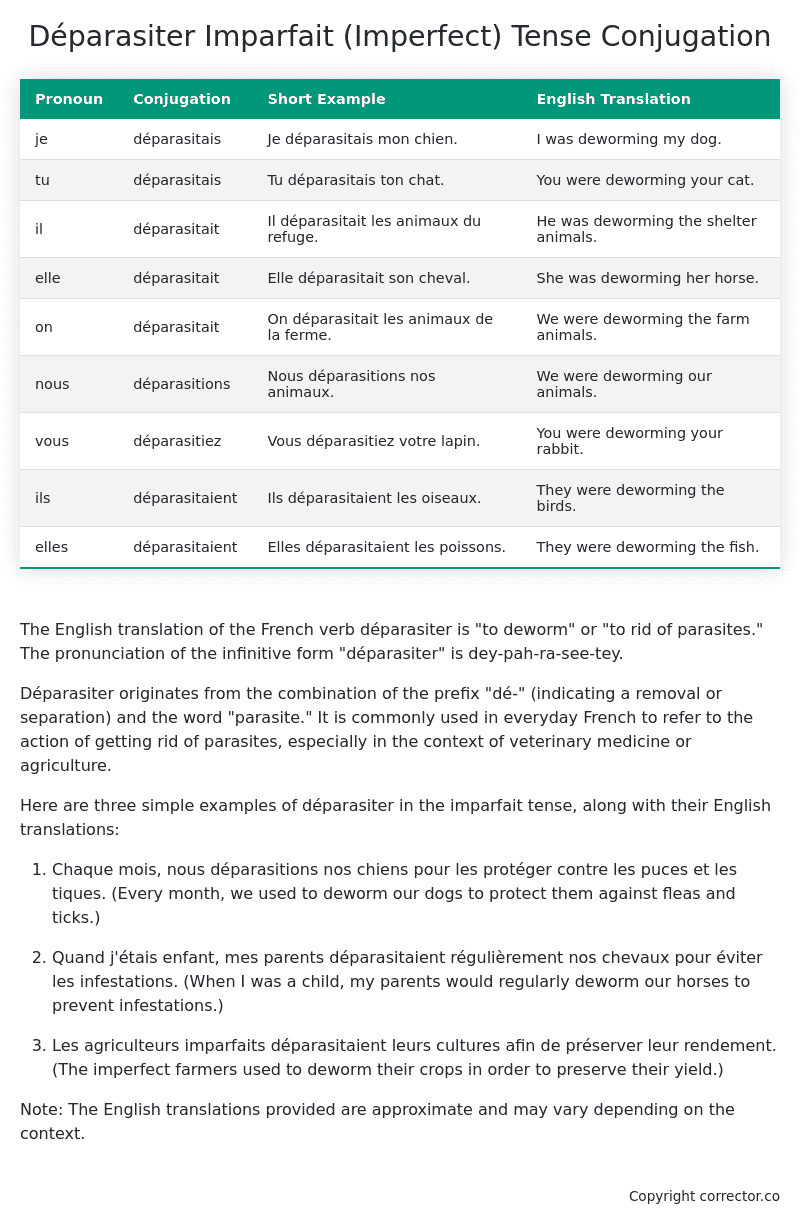Imparfait (Imperfect) Tense Conjugation of the French Verb déparasiter
Introduction to the verb déparasiter
The English translation of the French verb déparasiter is “to deworm” or “to rid of parasites.” The pronunciation of the infinitive form “déparasiter” is dey-pah-ra-see-tey.
Déparasiter originates from the combination of the prefix “dé-” (indicating a removal or separation) and the word “parasite.” It is commonly used in everyday French to refer to the action of getting rid of parasites, especially in the context of veterinary medicine or agriculture.
Here are three simple examples of déparasiter in the imparfait tense, along with their English translations:
-
Chaque mois, nous déparasitions nos chiens pour les protéger contre les puces et les tiques.
(Every month, we used to deworm our dogs to protect them against fleas and ticks.) -
Quand j’étais enfant, mes parents déparasitaient régulièrement nos chevaux pour éviter les infestations.
(When I was a child, my parents would regularly deworm our horses to prevent infestations.) -
Les agriculteurs imparfaits déparasitaient leurs cultures afin de préserver leur rendement.
(The imperfect farmers used to deworm their crops in order to preserve their yield.)
Note: The English translations provided are approximate and may vary depending on the context.
Table of the Imparfait (Imperfect) Tense Conjugation of déparasiter
| Pronoun | Conjugation | Short Example | English Translation |
|---|---|---|---|
| je | déparasitais | Je déparasitais mon chien. | I was deworming my dog. |
| tu | déparasitais | Tu déparasitais ton chat. | You were deworming your cat. |
| il | déparasitait | Il déparasitait les animaux du refuge. | He was deworming the shelter animals. |
| elle | déparasitait | Elle déparasitait son cheval. | She was deworming her horse. |
| on | déparasitait | On déparasitait les animaux de la ferme. | We were deworming the farm animals. |
| nous | déparasitions | Nous déparasitions nos animaux. | We were deworming our animals. |
| vous | déparasitiez | Vous déparasitiez votre lapin. | You were deworming your rabbit. |
| ils | déparasitaient | Ils déparasitaient les oiseaux. | They were deworming the birds. |
| elles | déparasitaient | Elles déparasitaient les poissons. | They were deworming the fish. |
Other Conjugations for Déparasiter.
Le Present (Present Tense) Conjugation of the French Verb déparasiter
Imparfait (Imperfect) Tense Conjugation of the French Verb déparasiter (You’re reading it right now!)
Passé Simple (Simple Past) Tense Conjugation of the French Verb déparasiter
Passé Composé (Present Perfect) Tense Conjugation of the French Verb déparasiter
Futur Simple (Simple Future) Tense Conjugation of the French Verb déparasiter
Futur Proche (Near Future) Tense Conjugation of the French Verb déparasiter
Plus-que-parfait (Pluperfect) Tense Conjugation of the French Verb déparasiter
Passé Antérieur (Past Anterior) Tense Conjugation of the French Verb déparasiter
Futur Antérieur (Future Anterior) Tense Conjugation of the French Verb déparasiter
Subjonctif Présent (Subjunctive Present) Tense Conjugation of the French Verb déparasiter
Subjonctif Passé (Subjunctive Past) Tense Conjugation of the French Verb déparasiter
Subjonctif Imparfait (Subjunctive Imperfect) Tense Conjugation of the French Verb déparasiter
Conditionnel Présent (Conditional Present) Tense Conjugation of the French Verb déparasiter
Conditionnel Passé (Conditional Past) Tense Conjugation of the French Verb déparasiter
Conditionnel Passé II (Conditional Past II) Tense Conjugation of the French Verb déparasiter
L’impératif Présent (Imperative Present) Tense Conjugation of the French Verb déparasiter
L’impératif Passé (Imperative Past) Tense Conjugation of the French Verb déparasiter
L’infinitif Présent (Infinitive Present) Tense Conjugation of the French Verb déparasiter
L’infinitif Passé (Infinitive Past) Tense Conjugation of the French Verb déparasiter
Le Participe Présent (Present Participle) Tense Conjugation of the French Verb déparasiter
Le Participe Passé (Past Participle) Tense Conjugation of the French Verb déparasiter
Struggling with French verbs or the language in general? Why not use our free French Grammar Checker – no registration required!
Get a FREE Download Study Sheet of this Conjugation 🔥
Simply right click the image below, click “save image” and get your free reference for the déparasiter imparfait tense conjugation!

Déparasiter – About the French Imparfait Tense
NOTE: To take a deep dive into all the French tenses then see our article on Mastering French Tense Conjugation.
Formation of the Imparfait Tense
For regular -er verbs:
For regular -ir verbs
For regular -re verbs
Common Everyday Usage Patterns
Description of Past Habits
Background Information
Mental and Emotional States
It’s employed to express emotions, thoughts, or physical sensations in the past. For example: “J’étais content quand il est arrivé.” (I was happy when he arrived.)
Ongoing Actions
Points to Note About the Imparfait Tense
Passé Composé vs. Imparfait
Conditional
Si Clauses
Narration
I hope you enjoyed this article on the verb déparasiter. Still in a learning mood? Check out another TOTALLY random French verb imparfait conjugation!


